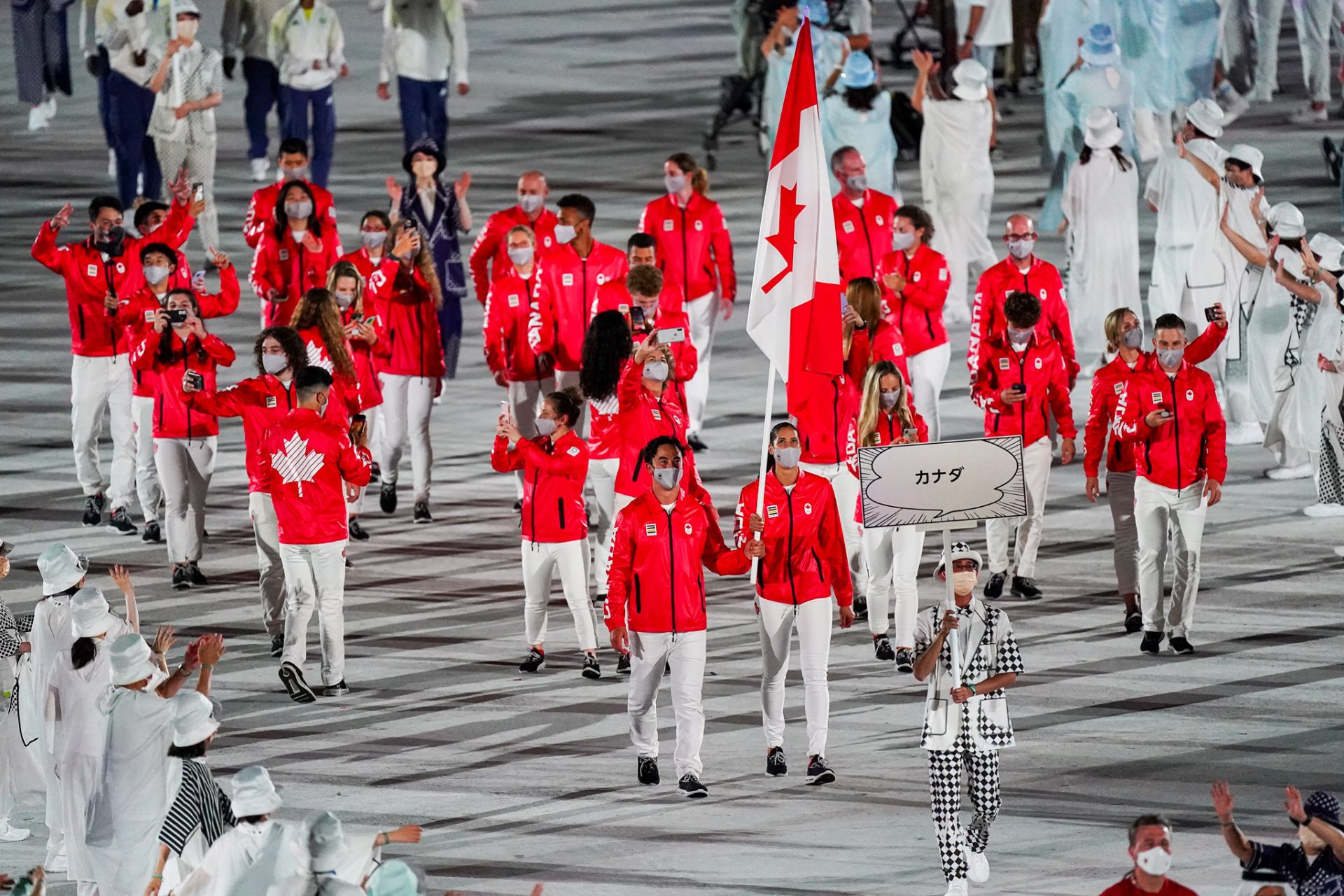The Olympics offer Canadians an opportunity to experience a collective sense of national unity and pride. But in the wake of discoveries of thousands of unmarked graves at former Indian Residential Schools across the country, this year’s Olympics will feel undeniably different for many Canadians.
Canadians will watch the Tokyo Games on television less than a month after many participated in “Cancel Canada Day” rallies and protesters tore down statues of colonial figures in Toronto, Victoria and Winnipeg.
In the wake of all this, settlers such as myself must ask ourselves: How can we cheer for our country after all that’s been happening?
View this post on Instagram
Audiences should use the Tokyo Games to confront the history and persistence of colonialism in Canada. Expressions of patriotism in Canada cannot be neatly separated from ongoing colonization and systemic racism, except through feats of mental gymnastics.
Let’s leave the gymnastics to the athletes competing in Tokyo and, instead, pay attention to the displays of settler colonialism that will happen during the Games.
More on Broadview:
- Indigenous group applauds United Church’s financial offer to communities impacted by residential schools
- Reconciliation’s future hinges on how well we can stomach uncomfortable truths
- What we know about the nutritional experiments performed on residential school children
My research investigates how Canadian-hosted sporting events, like the Olympics, shape national identity. I am currently writing a book, Commodifying the Nation: Sport, Commercialism and Settler Colonialism in Canada. In it, I argue that settlers often avoid recognizing uncomfortable truths about the nation when they express their patriotism. These truths include the mistreatment and assimilation of Indigenous children in residential schools.
Reminders of settler colonialism
There is a tendency to focus on large, highly visible objects that represent Canada’s colonial identity, like the recently toppled statue of Egerton Ryerson, who played a major role in the establishment of the residential school system in Canada. But this identity is also recalled in the various ways settler Canadians express their pride at international sporting events.
One reminder of colonialism will be embodied — literally — by Canadian athletes at the Games who will be wearing outfits designed by the Hudson’s Bay Company (HBC), which has been the Canadian Olympic team’s official outfitter since 2013.
Besides Team Canada’s outfits being created by the company, its iconic “point blanket” logo featuring coloured stripes appears on the outfits, along with national symbols like the maple leaf.
View this post on Instagram
HBC’s logo calls attention to its historical contributions to settler nation-building practices in Canada. Created by royal charter in 1670, King Charles II of England gave HBC the authority to trade and negotiate treaties with Indigenous groups and to defend territory from them.
Employees exchanged point blankets for beaver pelts supplied by Indigenous peoples, making them important items of the early fur trade. By conflating Team Canada’s outfits with HBC merchandise, this creates an association between the company and patriotic sentiments. It also contributes to the erasure of the nation’s history of colonialism.
Activists drew attention to this history in 2010 when Vancouver hosted the Winter Olympics. They argued that Canadians who wore the HBC-produced Team Canada red and white mittens had “blood on their hands” and were “wearing Canada’s history of colonialism.”
The ubiquity of HBC-branded Olympic clothing can productively draw attention to the history activists called on audiences to recognize back in 2010.
The present day
It would be a mistake to think that only the past is being obscured in collective displays of patriotism.
The reality that settler colonialism persists in Canada is too easily disavowed in celebratory representations of the nation. Disavowal is a particular type of forgetting. It involves knowing facts but failing to recognize the full significance or meaning of such facts.
When we disavow the injustices occurring around us, we fail to stop them from continuing. The example of anti-Olympic activists who protested the 2010 Games is once again instructive. They made it impossible to completely disavow the fact that the Games were being held on unceded Indigenous territory that is not governed by treaty.
Presently, we must not forget that the Canadian government and institutions continue to engage in practices that disadvantage Indigenous peoples and infringe upon their rights, such as the federal government’s chronic under-funding of Indigenous child and family services that’s led to an over-representation of Indigenous children in the child welfare system and the sytemic racism present in Canada’s health-care system.
What to do while cheering on Team Canada
I am not calling for settlers to wallow in guilt. Now is not the time to focus on how settlers feel. It is instead time to confront the reality of the consequences of residential schools and the ‘60s Scoop.
Land dispossession and systemic racism continue to exist and the historic mistreatment of Indigenous peoples is still ongoing.
Canadians should start by holding our governments and institutions accountable, and encourage the implementation of the Truth and Reconciliation Commission’s 94 Calls to Action.
View this post on Instagram
Calls 87-91 include telling the national story of Indigenous athletes and supporting Indigenous athletes’ development.
As settlers tune in to watch Canadian athletes compete in Tokyo this summer, they can seek out stories about Indigenous athleticism and leadership in sport because they won’t find any on their screens. No self-identified Indigenous athlete is competing for Canada this year.
As you wear your red and white and cheer for Canada from the comfort of your home, remember the history this patriotism was built on — and the ongoing colonialism that helps solidify it.
***
If you are an Indian Residential School survivor, or have been affected by the residential school system and need help, you can contact the 24-hour Indian Residential Schools Crisis Line: 1-866-925-4419.![]()
Estee Fresco is an assistant professor of communication studies at York University.
This article is republished from The Conversation under a Creative Commons license. Read the original article.


Comments
Gary says:
I won't watch the Olympics because it has long become a multi-million dollar political voice.
It no longer has anything to do with patriotism, just buy Nike's and Coke.
Wouldn't money going to these athletes and games be better used to clothe and feed people? (This coming from someone who despises Social Justice)
The same goes for professional sports leagues.